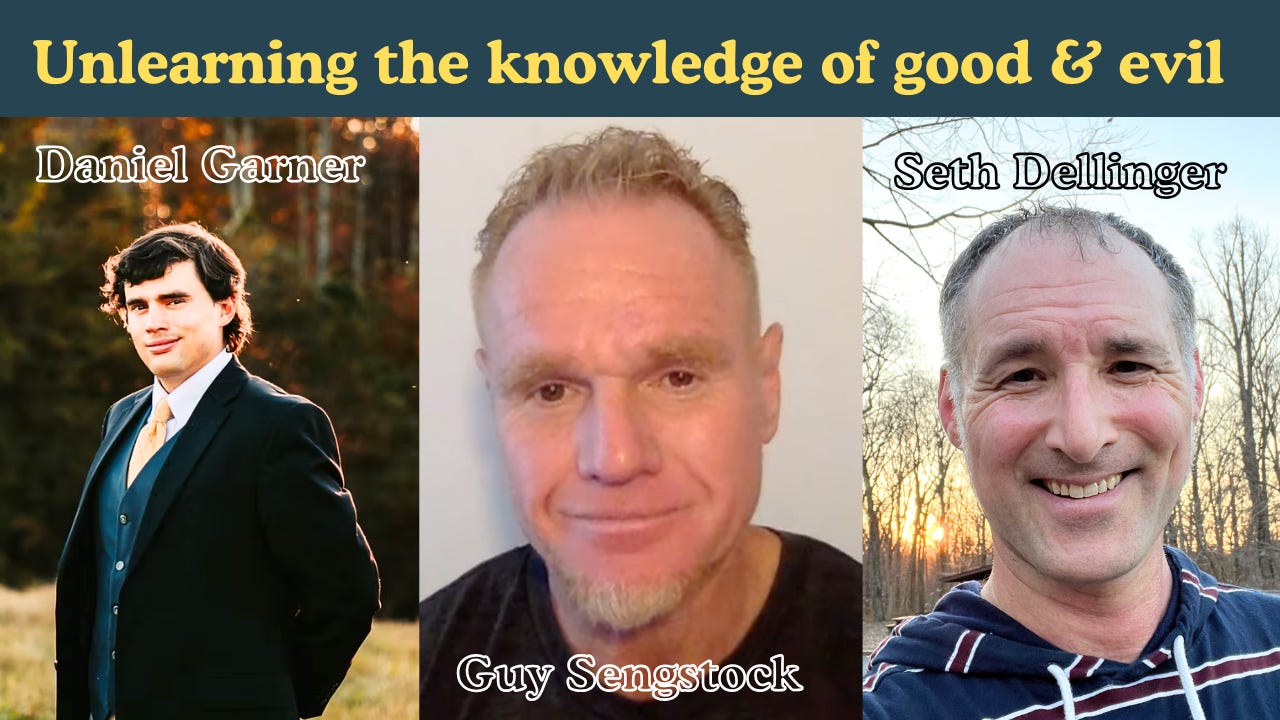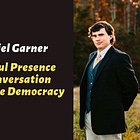Unlearning the knowledge of good & evil
A conversation with Daniel Garner & Guy Sengstock
When is it ok for me to dehumanize you?
When I have total certainty that I am “good” and you are “evil”!
Never mind that in the modern landscape, no two people can be counted on to define these terms similarly. Who wants to take the time to define terms, anyways?!
Who wants to take time to actually understand the other?
As “impractical” as it may seem to try to really see the humanity of those we disagree with, today we live in a world where our lack of curiosity about each other is literally killing us.
Instead, our culture teaches us that we can somehow be “independent” of others and that we may also curate our worlds to be just the way we like them to be.
All discomfort and inconvenience, be gone!
This would all be so perfect if it weren’t for those “other people,” right?! One can only hope that the futility of this perspective is becoming more obvious to more people.
What shall we do instead?
Learning to honestly recognize our current social reality and turn towards complexity with an open heart and a willingness to encounter dissonance is no simple task.
Yet every other proposed solution for humanity’s many mutating crises seems to turn on the foundational question of whether we can find the patience, courage and creativity to cultivate this disposition.
This was the subject of my recent conversation with philosopher Daniel Garner of O.G. Rose and Guy Sengstock, discoverer of the relational practice of Circling.
Our conversation was a “part two” of a previous conversation between Daniel and I:
Beginning with an exploration of the dynamics I encountered in the household of the Garner family during a recent visit to their home in Lynchburg, VA, we began with an exploration of the experience of relationship itself.
What are the inherent tensions of human relationship?
How are our relationships shaped by the surrounding environment?
How does each individual’s relationship to time and space impact how they experience others?
What does relationship FEEL like?
From there, we began to inquire into the capacities that are necessary if we are to shift the quality of social interactions from surface-level interaction - or even outright hostility - into spaces where deeper human connection can flourish. We discussed the role of developing more capacity for nervous system regulation and better listening skills, and how expanded life experience and existential inquiry through philosophy and other disciplines increases one’s overall capacity for relationship.
The final stretch of the conversation delved into some of the more difficult dynamics of relationship where there are no easy answers, yet are too persistent to be ignored.
How can we meet hostility with an openness that creates a shift towards true dialogue?
How can we escape the trap of blame?
What creates intimacy, what erodes it and how can it be restored when it is lost?
Below are a couple excerpts followed by the full conversation.
We have tentative plans to continue this inquiry, so stay tuned!
Guy talks about the inherent tension in human relationships (enacted again and again in conversation) between our desires for belonging and autonomy:
Daniel talks about the story of Adam and Eve as a foundational myth of “good” and “evil” and how the use of these categories is at the heart of the hostility in today’s world:
Full conversation:









Excellent work, Seth, and I really enjoyed this conversation and everything we explored together. Thank you for making possible the space.
Maybe circling is a natural need, instinct like, “how will we rescue those people in trouble on the mountain….?”
Propositional circling is, Hi mom, I have my podcast live, we are having a good time, people seem to like us.
Who around here knows about emerging?
Is it the same feeling of the emergency and *they seem to know what they are doing* I don’t have time, I must hurry away.
Or is it more like a Tsunami that lost the couch and tv, yet still waits and waits for the screen to come back to life, with God like instructions or the teleprompter?